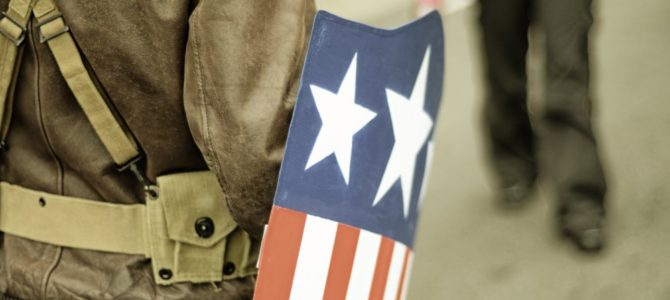
Captain America is today one of the most popular superheroes. More importantly, he has been the embodiment of U.S. values and a symbol of American exceptionalism.
Marvel Studios wisely decided to put him in the center of its cinematic universe. In 2011, the movie “Captain America: The First Avenger” was released, and it became a starting point for the whole Avengers saga.
Yet because the ideological climate has changed, many of the political views Steve Rogers expressed in his first big picture seem from today’s perspective almost hard-line conservative. For example, when Cap defeated Red Skull at the end of the movie, the supervillain looked at him and shouted: “You could have the power of the gods! Yet you wear a flag on your chest and think you fight a battle of nations. I have seen the future, Captain. There are no flags!”
Rogers replies “Not my future!” and flings his shield at Red Skull. Translated into political terms, the villain imagines, in the words of John Lennon, “there’s no countries,” a world without borders or national flags. On the contrary, Cap fights for the American flag.
If this isn’t what it means to be a conservative and an American patriot, what is, really? Nevertheless, these days such dialogue seems strange, to say the least, if not entirely surreal.
Flash forward to 2021. In the first half of this year, Marvel Studios released three TV shows set in the MCU on the streaming service Disney Plus. Although one of them, “The Falcon and the Winter Soldier,” is about Captain America, Rogers no longer appears in it. After the spectacular ending of his story arc in the “Avengers: Endgame,” he decided to retire and leave his shield, along with everything it represents, to his buddy Sam Wilson, a superhero known as Falcon.
A Marvel miniseries explores how Falcon tries to come to terms with this inheritance. In addition to his inner struggle, we see another storyline about refugees and the state of the world after the global catastrophe (so-called “Blip”) that occurred in the “Endgame.”
In that storyline, many people are dissatisfied with political elites and demand that humanity face this challenge together, united, as the “one world, one people.” These voices are represented by the terrorist organization called “Flag Smashers” led by the young revolutionary Karli Morgenthau. Although Falcon fights them, he clearly and repeatedly states that agrees with their ideological demands and rejects only their violent methods.
Morgenthau is written as a sympathetic character. As Erin Kellyman, the actress who played her in the show, stated in one interview, “The root of [the Flag-Smashers] is quite good, and what they’re fighting for is something I feel a lot of people can agree with. It’s kind of that weird in between, where she’s not a villain and not a hero.”
In the last episode of the show, after Falcon defeats Karli in the final battle, he confronts a U.S. senator, who is skeptical about the idea of a united world. “You’ve gotta do better, senator,” Falcon advises him in the longest monologue of the show. “You’ve gotta step up. Because if you don’t, the next Karli will.”
When the senator argues that Morgenthau was a dangerous terrorist, he disagrees. “These labels—’terrorists,’ ‘refugee,’ ‘thug’—they’re often used to get around the question. Why?”
In the end, Falcon becomes Rogers’s successor and embraces the name Captain America. But the change of tone from “The First Avenger” is as bright as the daylight on the Asgard. The best example of this ideological shift is the name of the terrorist group led by young Morgenthau: Flag Smashers.
The original Captain America was willing to defend the flag with his life and fought to the death against a megalomaniac who wanted to destroy everything it represents. The modified Captain America, on the other hand, explicitly defends the idea of a unified world without national flags. Although only a few years have passed, this is a substantial ideological change.









